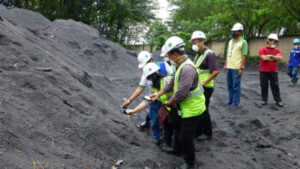|
|
|
|
|
|

Wednesday, 26 January 2022
14:00 (Vienna, Austria time)
Moderator: H. Burçin Okyar (IAEA)
Presenters: Bogusław Michalik, Cristina Nuccetelli, Leo van Velzen
Organized jointly with the RadoNorm
Many industries processing naturally occurring radioactive material (NORM) follow a common cycle with several stages from the extraction of materials to the fabrication and the use of products and by-products, including the generation of discharges, residues and waste. An integrated approach to radiation safety and protection is required and consideration needs to be given to radiation protection of workers, the public and the environment for a wide range of industrial processes on a global basis.
A graded approach is among the key concepts of IAEA International Basic Safety Standards (GSR Part 3) and guidance is provided for its proper implementation in IAEA General Safety Guide on Occupational Radiation Protection (GSG-7), which is also in line with and required under the 2013 European Directive. Based on the Italian approach, the procedure of exemption from notification for further regulatory control is possible in two stages. It requires the application of a limitation of activity concentration as a very first stage, and in terms of radiation dose, if exemption levels are not violated. Only in cases where effective doses of workers and members of the public exceed appropriate levels of effective dose, the planned situation is not exempted, and the undertaker must adopt provisions about the protection of workers and of members of the public. The graded approach can be also found in the introduction of NORM residue classification, based on activity concentration and doses to members of the public, and the implementation of authorized and specialized landfills which can accept NORM residues not exempted under current exemption criteria.
The webinar will look at the RadoNorm project under EURATOM Horizon 2020, which aims at managing risk from radon and NORM exposure situations to assure effective radiation protection based on improved scientific evidence and social considerations. The proposed multidisciplinary and inclusive research project target all relevant steps of the radiation risk management cycle for radon and NORM exposure situations.
The webinar will also provide information on the Tenth International Symposium on Naturally Occurring Radioactive Material (NORM X) to be held from 9-13 May in Jaarbeurs, Utrecht, the Netherlands. The Symposium will focus on circular economy — the use of residues from industrial operations involving NORM — developments in traditional ‘cradle to grave’ approaches, the application of a graded approach, decision making on optimization of protection and safety for industrial operations and processes, and progress made since the 2019 NORM IX Symposium and the 2020 International Conference on the Management of NORM in Industry.

Bogusław MICHALIK
Bogusław Michalik received his MSc majored in Applied Physics at Silesian University, Katowice, Poland, in 2002. He is a PhD recipient in Environmental Engineering from the Central Mining Institute, Katowice, Poland, and then he received habilitation in 2012. Currently he is the Associate Professor in Silesian Centre for Environmental Radioactivity at Central Mining Institute, Katowice, Poland.
Mr Michalik started his professional career in the early 1980s with the identification and monitoring of enhanced natural radioactivity in subsurface coal mines. Currently, his research interests include the theory and practice of radiation protection and radioecology especially focused on environmental radioactivity and NORM.
The experience gained in NORM investigations allowed him recently to also assist the emerging Polish nuclear industry to solve problems related to environmental radioactivity.

Cristina NUCCETELLI
Cristina Nuccetelli is a physicist, researcher in the Italian Institute of Health, National Center for Radiation Protection and Computational Physics (ISS) from 1990. Her main field of expertise is the environmental radioactivity, in particular NORM. Her activities about NORM include research in radiation protection and in experimental characterization issues. She is also a consultant for NORM institutional aspects for governmental and regional bodies in Italy. She is a member of the Board of European NORM Association and of the Steering Committee of European ALARA Network and she is involved in the IAEA ENVIRONET Project.

Leo VAN VELZEN
Leo van Velzen has 40 years of experience in the field of radiological characterization, in particular in the field of non-destructive methodologies applicable to residues/wastes contaminated with natural occurring radionuclides, to artificial radionuclides and to the characterization of radioactively contaminated sites.
Mr. van Velzen has been working as a private researcher and developer and consultant since 2016. Before that, he was a senior consultant at NRG, where he was responsible as project leader of several European Commission Framework R&D projects and accountable as lead engineer for the development of the proto-type of the HIRACHI-system (segregating of historic research reactor LLW and ILW by non-destructive methods in a hot-cell).
Mr. van Velzen holds a bachelor’s degree and has been a member of Steering Committee of the European Network of Testing Facilities for Quality Checking of Radioactive Waste Packages since 1993, further he is a Steering Committee member of IAEA’s ENVIRONET Project, Chair of the IAEA’s LABONET Network, and Board member and Chair of the international Scientific Program Committee of the NORM X Symposium to be held in 2022 in the Netherlands.
Two officers from the Nigeria Nuclear Regulatory Authority were trained in Accra, Ghana from the 1st to 4th July 2019 on the application of the National Dose Registry (NDR) software.
The NDR is a personnel dose management software developed by the National Institute for Radiological Protection of China.
The two officers, namely, Mr. Innocent Okporo and Mr. Umar Mustapha Garba were trained on the software by Ms. Edith A. Amoatey a Scientist of Radiation Protection Institute, Ghana Atomic Energy Commission while Dr. Joseph K. Amoako, the AFAN Secretary/Treasurer coordinated their visit.